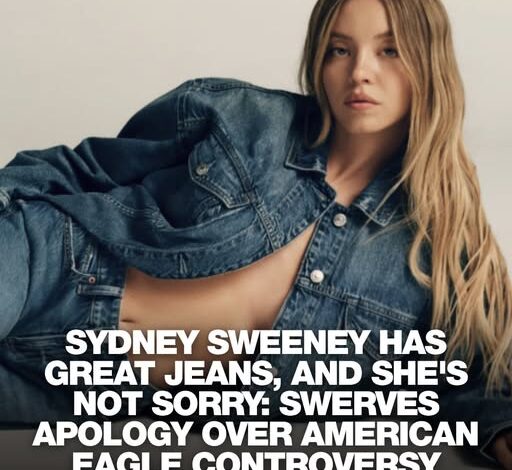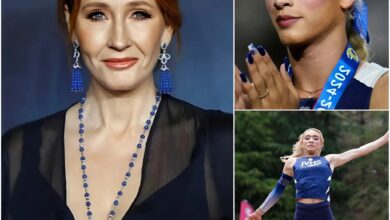SX Sydney Sweeney Claps Back: The Star Breaks Silence on the American Eagle ‘Great Jeans’ Controversy

In the summer of 2025, a campaign starring actress Sydney Sweeney and the denim brand American Eagle ignited far more than just a sale push—it triggered a cultural flashpoint. The campaign, titled “Sydney Sweeney Has Great Jeans,” played on a pun between “jeans” and “genes,” and featured Sweeney touting inherited traits like hair and eye color, before transitioning to that final line.
What followed was a wave of criticism, misunderstanding, and debate. Now, in a November 2025 interview with GQ, Sweeney has finally addressed the uproar—somewhat reluctantly, some with resolve, and definitely with a renewed question about how art, commerce, identity and culture collide.
The Campaign That Became a Flashpoint
Launched on July 23, 2025, the American Eagle campaign opened with visuals of Sweeney in full denim and captions like:
“Genes are passed down from parents to offspring, often determining traits like hair color, personality and even eye color. My jeans are blue.”
The ad then concludes with the line:
“Sydney Sweeney has great jeans.”
— a twist of “genes” → “jeans”.
At first glance it might seem innocuous: an actress known for her style, a jeans campaign, a catchy line. But critics argued the visual choices (blond hair, blue eyes) combined with the pun suggested genetic superiority.
Uploads across TikTok, X (formerly Twitter) and Reddit interpreted the campaign as more than retail—some viewed it as tone-deaf or worse. According to one article:
“…the usage of the word ‘jeans’ as a play on ‘genes’ is racially charged and hints at genetic superiority.”
On the flip side, others defended the campaign as playful marketing, or even pointed out that the brand’s stock spiked following its release.
Sweeney’s Response: Calm, Firm—and Selective
When asked in her GQ interview about the backlash, Sweeney began with candour:
“I did a jean ad … I mean, the reaction definitely was a surprise, but I love jeans. All I wear are jeans. I’m literally in jeans and a T-shirt every day of my life.”
She wasn’t eager to lean into the controversy:
When asked whether she wanted to speak to the “genetic superiority” critique directly, she replied: “I think that when I have an issue that I want to speak about, people will hear.”
Pressed further on the fact that political figures—including Donald Trump (who reportedly called it “the hottest ad ever”) and JD Vance—had weighed in, Sweeney described it as “surreal.”
Importantly, she described how she was largely removed from the social-media firestorm due to her filming schedule:
“I kind of just put my phone away. I was filming every day … I don’t really bring my phone on set, so I work and then I go home and I go to sleep. So I didn’t really see a lot of it.”
Her bottom line: the ad, in her view, was “about jeans,” and the rest of the narrative wasn’t something she felt defined by—or one she felt needed to refute every angle.
Why the Firestorm? The Layers Beneath a Jeans Ad
What made a campaign about jeans explode into a culture-war moment? Several overlapping factors:
- Word Play & Visuals — The “genes” → “jeans” swap isn’t just clever; it treads on deeper ideas of inheritance, traits, identity. When paired with blond hair/blue eyes imagery, critics say it echoes historic eugenics tropes.
- Timing & Social Context — In a moment where brands are highly scrutinized for representation, diversity and the nuances of messaging, this campaign landed amid a broader cultural tension about “wokeness” and “anti-wokeness.”
- Amplification by Public Figures — When Trump and Vance make commentary about it, what was initially a fashion campaign becomes a signal in partisan discourse. Sweeney herself called the attention “surreal.”
- Brand Metrics vs Public Perception — On one hand, American Eagle claimed strong business performance and new customer acquisition tied to the campaign. On the other hand, blogs and social media tracked the outrage, interpretive layers and backlash.
All of this means that what started as a model-led advertising push morphed into a cultural mirror: the ad reflected not just jeans, but our anxieties about identity, marketing, race and public discourse.
What This Means for Sweeney & Her Career
For Sweeney, the controversy provides both a challenge and an opportunity. Here are key take-aways:
- Control of Narrative: By choosing when and how to address the backlash, Sweeney is signalling that she controls her engagement with it. She’ll talk—but when she chooses.
- Focus on Work: Her comments emphasise that she isn’t defined by the campaign or the reaction, but by her work—projects like Christy (a biopic she produced) and her role in Euphoria.
- Brand Partnership Risks: This serves as a reminder that celebrity-brand collaborations can carry high stakes beyond sales—acknowledging nuance in message and representation matters.
- Public Identity & Alignment: With the campaign being interpreted politically, Sweeney finds herself navigating how (or whether) to publicly align or distance from the various commentaries.
The Bigger Picture: Advertising, Identity & Interpretation
What this episode demonstrates is that marketing—even one about denim—cannot fully escape the interpretive field in which it operates. A few larger reflections:
- Intent vs Impact: While the brand claimed the message was simply about “good jeans,” the impact—how people interpreted it—was different. This gap can cause major backlash.
- Symbolism in Simplicity: A line like “My jeans are blue” may seem throwaway, but in the current cultural environment, it carries symbolism about who is visible, who is represented, what traits are celebrated.
- Brand Responsibility: In an era of heightened scrutiny, brands need to anticipate more than just immediate reaction—they must consider deeper cultural registers and media interpretations.
- Celebrity Role in Culture: As a face of the campaign, Sweeney became a node where fashion, commerce and cultural debate collided. Her reaction—and non-reaction—both tell a story of how celebrities are expected to respond when brand campaigns go off script.
Final Thoughts
Sydney Sweeney’s response to the “Great Jeans” campaign backlash may not have offered loud, sweeping apologies or mea culpas—but that seems to be the point. She is opting for a quieter, more controlled answer:
“I know who I am. I know what I value. … I’m just excited to see what happens next.”
Whether or not one agrees with how the campaign was conceived or interpreted, the affair serves as a potent case study in how even a jeans ad can become a spectacle of identity, symbolism and debate. For Sweeney, the controversy may well be a footnote—but it’s one that reflects the time in which the ad launched.
